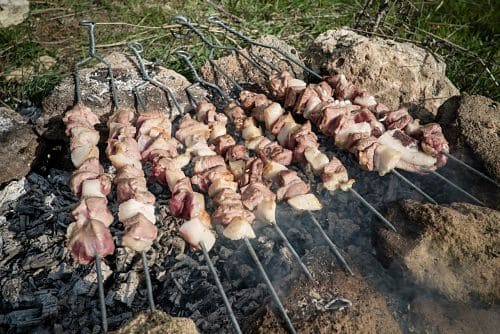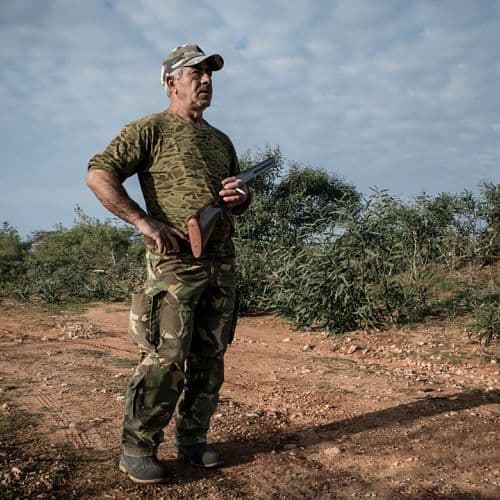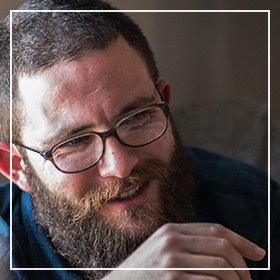November 2015; I proceeded ten metres behind Ertan Abi for much of the morning, a place in which I was not directly within the firing line but could also observe acutely what was going on. Before proceeding from where we disembarked from his vehicle, everyone had confirmed and asked each other in short gestures and barely formed words whether we were going a certain way. Everyone seemed to agree on the obvious choice of which direction – inland along the stream bed. Ertan’s gun was loaded as he walked. Right hand griping it near the trigger with the end resting nested between his left forearm and bicep. He calmly walked, every so often urging his two dogs to stay around twenty metres in front of him. We cut through fields, shrub-land, up and over boulders, hills, steep mud faces, into little groves, along the stream bed, sometimes in almost marshy terrain. From the road these varied terrain were basically imperceptible, hidden between hillocks and flats of ploughed or resting fields, destined for barley and wheat crops to be harvested the following year.
We had been rambling consistently for around an hour, everyone calmly surveying the land in front of them as they proceeded, winding and skipping along the different features of the landscape as the sun started to more fully rise. A flutter ahead, that I only registered after it occurred, caused Ertan to bring his shotgun up to his shoulder with his eye looking down the barrel; two quick shots left ghost trails of smoke in the wet morning air. With the second shot the partridge had been downed and Ertan’s dog was all over it. He rapidly ran forward to remove it from his dog’s jaws before it had time to do more then simply pick it up. Everyone in the line had stopped, and the quick confirmation of simply ‘got it?’ was replied with just ‘partridge’. It had all happened so quickly I had been looking to one side and hadn’t even manage to capture the first moments on my head mounted camera. Ertan was now hanging the bird from the specially made loops of leather on his belt. Each one through which a bird’s head could be placed, the loop tightened and thus the bird hung from his belt. We quickly continued as the rest of the hunting banya (~band) had proceeded, with the bird bumping on the back of Ertan’s right thigh as he walked. At first his dog, Simba, wouldn’t leave off sniffing at the bird. Ertan stooped, let her sniffle at it for a couple seconds and then gestured with his head and a sound for Simba to carry on ahead, and off she went.
August 2015; I ask him how he is today. He carries on milking the goat. We don’t talk for the next four hours as he shows me how to tend his small-holding. He has deep wrinkled olive skin and a scruffy beard with a scarecrow’s head of hair. He’s called Keco, a play on the word Goat in Turkish Cypriot. Possibly because he resembles one, or more likely from his earlier days leading a rebel militia in the mountains. After work he lights his weekly barbecue and I ask him if he ever goes hunting. He pours me a Rakı in response. He proceeds to eat all of his vegetables raw, standing up occasionally to turn the skewered lamb. We chew together, almost in rhythm. After twenty minutes of continued chewing, with the distant waves breaking on the shore, the jingle of goats bells as they moved around, and the crackle of the fire, he pulls off a row of meat onto my plate and replies “I know better now” and returns to his antiquated white plastic chair to chew on a freshly cut piece of kohlrabi.

October 2014; My first challenge was changing my original field-site from Sierra Leone for medical reasons. A workable option was going back to where I grew up; Northern Cyprus. I picked hunting as my focus as I was directly familiar with many aspects of life there, but I had remained largely ignorant of this activity. The challenge here was to work in a place in which I already had friends and deeply embedded personal connections.
In retrospect I am exceeding glad I did end up doing a form of ‘Anthropology at Home’, rather than having parachuted myself into somewhere where I would have still been ignorant after a year of fieldwork.
Studying a contentious activity, somewhat antithetical to my own social groups values, surrounded by relationships that mattered to me, that was a real challenge.
2014 – 2016; My fieldwork was organised weekly, focussed around weekend hunting. Monday would be spent recovering from Sunday, uploading video and notes, and plotting the week ahead. Interviews were rarely booked in advance, such is the temporality of N.Cyprus. I would spend a day or two at the offices of the local hunting federation, digging through old paperwork, taking daily opportunities as they arose, whether to deliver live partridges or sit in on vocal meetings. Many a day was spent with the two secretaries, Hayriye and Esra, updating their organisational facebook profile, chit chatting with people coming in and out, interjecting with a research question and making new contacts for follow-up interviews. Alternately I was calling those contacts early each morning and hitch-hiking to their locations to develop a portfolio on them and their hunting activities. Questionnaires would be rustled up for occasions with large amounts of people, and social occasions attended with many a coffee or Rakı drunk.
On weekends I focussed on what was to become my hunting banya (~band) and their village. My own particular research style lent itself to hunting, questions and interviews being more of a classificatory and accoutrementary method. Participation in common conversations and helping people out as they hunted, celebrated, worked, typed, ate, negotiated, policed whilst reflexively making notes and film chronicling my observations, feelings and participations, was where the core of my research understanding emerged. Combing local archives, the interweb, social-media, articles and countless books, I also dug up a library of statistical, historical, environmental, archaeological and ethnographic material pertinent to my focus on contemporary hunting in N.Cyprus and Europe.
Overall much of my time was spent in the company of weathered older men as they negotiated and adapted an inherited colonial bureaucracy, and shared the unique temporal presence of hunting as we participated in the sylvan rhythms of the landscape.
I have done this work because I felt akin but poorly understood what it means to be an eating, breathing, living man in Europe today. As an anthropologist I am commonly thought to be an expert on prehistoric or ‘exotic’ hunter-gatherers, with the bulk of anthropological writing shaped by these two foci. In my research on contemporary hunting and life in N.Cyprus I found a rich subject undermining the sacred narratives powering common interpretations of these two foci. I have also consumed, polluted and been a party to raining down moralising advice on people on how they should relate to their environment, with little or no experience of ever having genuinely done so. For fuck sake! I had never owned the responsibility that comes with being alive: other living beings will die, while I had let other people, machines and chemicals do it for me.
My work is about digging beyond these words, concrete cubicles and black mirrors, to the organic and human world that is presented to us through them.
*******
Featured image: Ertan Abi – Credit: Johan Duchateau






Abraham, nice field notes. Where do you see them pointing you?
Hi John, thanks, thought I would just share a few scribblings to tentatively test the water on my writing style (so appreciate the feedback), and also when people/friends ask me what I have been getting up to I have a few bits for some easy browsing. And finally what I feel I can say at this point without doing my participants an injustice, as doing them, my data and myself justice still requires more patient work.
In terms of your question, I am basically writing up my thesis and have come to a number of pointed conclusions. Some of the points are implied slightly in the text. One being something I believe we have touched on before, which is that hunting and gathering are often squeezed into 3 different categories in global and academic discourse. These categorisations in some sense are ‘sacred myths upholding’* dominant ways of life and often perverting others. So my current job is to ‘reveal a new class’* through ethnography and undermine those myths and the dominant way of life they prop up. That is very broadly what I am pointing at. The points themselves will have to wait, though in the meantime even a small tit-bit like this may slightly unsettle those myths in some readers, or not.
* http://thememorybank.co.uk/2010/11/18/1345/
P.S. Having said that, Allegra have taken the initiative to have a focus on ‘fieldnotes’ and ‘fieldwork’ which in my eyes is about appreciating anthropology in a less normative sense, and more simply getting a taste for other peoples research experiences and fieldsites, which can help critiquely unpack their own or prepare others. Nuff said 🙂